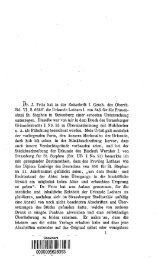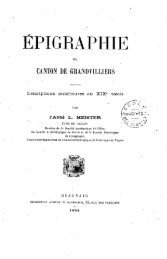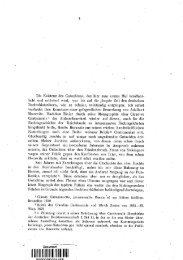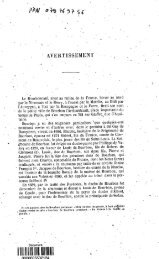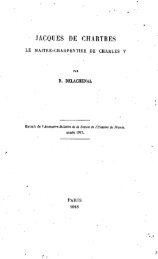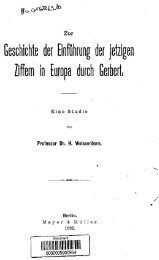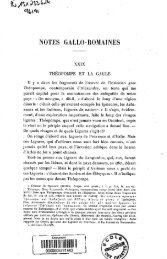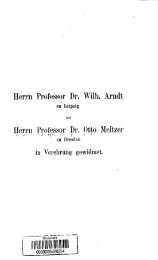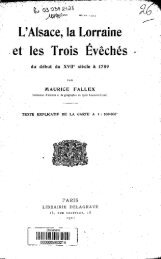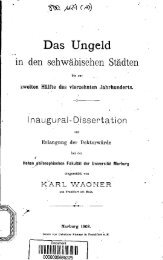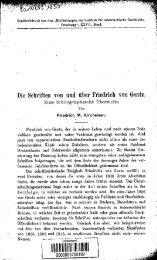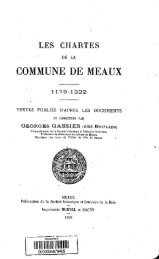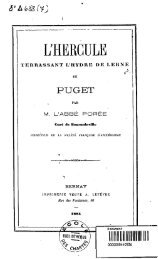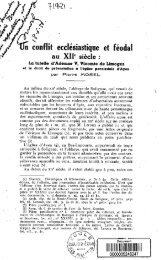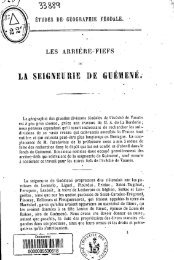Propositionalism and atomis in Ockham's semantics
Propositionalism and atomis in Ockham's semantics
Propositionalism and atomis in Ockham's semantics
Create successful ePaper yourself
Turn your PDF publications into a flip-book with our unique Google optimized e-Paper software.
jjQJ'}1O<br />
PROPOSITIONALISM AND ATOMISM<br />
IN OCKHAM'S SEMANTICS*<br />
The term "propositional ism" has been proposed as a label for <strong>Ockham's</strong><br />
theory of language by the Spanish scholar Teodoro de Andrés<br />
<strong>in</strong> his 1969 book, El nom<strong>in</strong>alismo de Guillermo de Ockham como filosofia<br />
del lenguaje. For de Andrés' Ockham, the proposition rather than the<br />
term is "the primary complete l<strong>in</strong>guistic unit" <strong>and</strong> the "primary reality"<br />
of knowledge.' On the other h<strong>and</strong>, the expression "semantical <strong>atomis</strong>m"<br />
is used by Michael Loux <strong>in</strong> a 1979 paper to characterize the<br />
st<strong>and</strong>ard term<strong>in</strong>ist tradition which, he claims, Ockham breaks with.<br />
For Loux's Ockham, "the mean<strong>in</strong>g of a general term is a function of<br />
the roles it plays <strong>in</strong> propositional contexts" <strong>and</strong> "it is impossible to isolate<br />
a non-propositional component <strong>in</strong> a speaker's l<strong>in</strong>guistic knowledge."'<br />
André? <strong>and</strong> Loux's <strong>in</strong>terpretations are remarkably similar to each<br />
other. I will call them "propositionalist <strong>in</strong>terpretations of <strong>Ockham's</strong><br />
<strong>semantics</strong>." They are not the only ones <strong>in</strong> the literature. The History<br />
of Philosophy edited <strong>in</strong> French by François Chãtelet <strong>in</strong> 1972 has a chapter<br />
on Ockham written by Patrick Hochart, the ma<strong>in</strong> theme of which is<br />
that the primary character of a l<strong>in</strong>guistic sign is that of be<strong>in</strong>g a part<br />
of a proposition.' And Joel Biard, <strong>in</strong> a French paper on "the Ockhamist<br />
*1 wish to thank John Boler, Sten Ebbesen, Jerry Etzkorn, <strong>and</strong> Robert<br />
Nadeau for helpful comments on prior versions of this paper, <strong>and</strong> the Social<br />
Sciences <strong>and</strong> Humanities Research Council of Canada for its f<strong>in</strong>ancial<br />
assistance.<br />
'Teodoro de Andrés, El nomirialismo de Guillermo de Ockham co<strong>in</strong>o filosoha<br />
del lenguaje (Madrid: Editorial Gredos, 1969) 219-20, 233-36, <strong>and</strong> passim.<br />
2 Michael Loux, "Significatio <strong>and</strong> Suppositio: Reflections on <strong>Ockham's</strong><br />
Semantics," The New Scholasticism 53(1979): 423-24,<br />
Patrick Hochart, 'Le signe et sa duplicite," <strong>in</strong> La philosophic mëdievale<br />
(du icr au XVe siècle), ed. by F. Châtelet (Paris: Hachette, 1972) 190- 1.<br />
Document<br />
ll1lltIlI1Il11<br />
0000005573677<br />
J<br />
i: •<br />
c'<br />
:'
62 CLAUDE PANACCIO<br />
redef<strong>in</strong>ition of signification," published <strong>in</strong> 1981, stresses what he calls<br />
the "propositional dimension of signification."4 Strik<strong>in</strong>gly enough, none<br />
of these authors quotes or even mentions any of the others. They apparently<br />
all came to the same conclusion through their own <strong>in</strong>dependent<br />
read<strong>in</strong>g of <strong>Ockham's</strong> Summa Logicae.<br />
Moreover, they unanimously see this propositionalist theory of<br />
Ockham as break<strong>in</strong>g <strong>in</strong> a very important way with the former <strong>atomis</strong>tic<br />
philosophy of language. Let me quote Michael Loux's version of<br />
the claim (but more or less the equivalent can be found <strong>in</strong> the others):<br />
What I take to he novel or orig<strong>in</strong>al <strong>in</strong> <strong>Ockham's</strong> account of significario<br />
<strong>and</strong> supposirio, then, is its <strong>in</strong>cipient holism; <strong>and</strong> I want to claim<br />
that st<strong>and</strong>ard studies of his theory of language have gone wrong <strong>in</strong><br />
fail<strong>in</strong>g to recognize this revolutionary aspect of his logic. Historians<br />
like to tell us that it was Kant who first rejected the <strong>atomis</strong>m of traditional<br />
philosophy. I am suggest<strong>in</strong>g that this picture of the history of<br />
philosophy is wrong: Ockham took the Kantian turn several centuries<br />
earlier; or better: Kant's emphasis on the primacy of the judgmental<br />
form is a variation on an essentially Ockhamistic theme.5<br />
A whole picture of the history of philosophy is thus at stake here.<br />
And it is true that the proposition alist readers of Ockham might very<br />
well have put their f<strong>in</strong>gers on someth<strong>in</strong>g important. But all of them<br />
exaggerate their case <strong>in</strong> a very mislead<strong>in</strong>g way when they say th<strong>in</strong>gs<br />
such as: "the proposition ( ... ) is <strong>in</strong> fact the primary complete l<strong>in</strong>guistic<br />
unit"; 6 or: "the l<strong>in</strong>guistic sign ... has mean<strong>in</strong>g <strong>and</strong> validity only <strong>in</strong> the<br />
process of the proposition"; 7 or aga<strong>in</strong>: "Ockham ( ... ) wants to deny<br />
that the word-world relations <strong>in</strong>volved <strong>in</strong> personal suppositio are<br />
mediated by any prior semantical relation";' or f<strong>in</strong>ally: "signification<br />
presupposes supposition."9 I will here discuss the arguments <strong>in</strong> favor<br />
of the propositionalist <strong>in</strong>terpretation <strong>and</strong> show that they cannot support<br />
the very strong claims that are supposed to rest on them. I will<br />
Joel l3iard, "La redef<strong>in</strong>ition ockhamiste de Ia signification," <strong>in</strong> Sprache<br />
und Erkenritnis im Mitte!a!ter, ed. by W. Kluxen et al. (Berl<strong>in</strong>: Dc Gruyter,<br />
1981) 458.<br />
Loux 425.<br />
6 Andrés 220.<br />
Hochart 190.<br />
8 Loux 420-21.<br />
Biard 458.
Prnpositionalfsrn <strong>and</strong> Atomism <strong>in</strong> Ockham 63<br />
briefly consider two auxiliary arguments <strong>and</strong>, then, come to grips with<br />
the really central one.<br />
First, there is of course the pla<strong>in</strong> fact that supposition, for Ockham,<br />
is propositional: it is only <strong>in</strong> the context of a proposition that<br />
a term acquires a supposition or, <strong>in</strong> modern dress, a referential function.<br />
De Andrés sees this as the basis for <strong>Ockham's</strong> propositionalism,10<br />
<strong>and</strong> Lambertus Marie de Rijk, as is well known, holds that <strong>in</strong> do<strong>in</strong>g<br />
away with natural supposition, which was a non-propositional variety<br />
of supposition accepted by the ma<strong>in</strong> logicians of the thirteenth century,<br />
Ockham was <strong>in</strong> fact restor<strong>in</strong>g the orig<strong>in</strong>al <strong>in</strong>spiration of medieval<br />
<strong>semantics</strong>, the "contextual approach." I do not <strong>in</strong>tend to discuss this<br />
po<strong>in</strong>t <strong>in</strong> any detail here, s<strong>in</strong>ce I have done so <strong>in</strong> a forthcom<strong>in</strong>g paper<br />
on "Natural supposition <strong>and</strong> Ockhamistic signification," <strong>in</strong> which I<br />
try to show that Ockham does not really elim<strong>in</strong>ate the idea of natural<br />
supposition, but only the label. ' 2 Natural supposition, <strong>in</strong> Peter of Spa<strong>in</strong><br />
for <strong>in</strong>stance, was the semantical relation of a general term taken <strong>in</strong><br />
itself to each one of the <strong>in</strong>dividual th<strong>in</strong>gs, present, past, or future, of<br />
which it is, was, or will be true.' 3 Ockham keeps this relation as a<br />
major piece of his semantic theory, but he calls it "signification" (or<br />
sometimes "primary signification"). What he gets rids of is rather the<br />
former realist notion of signification found <strong>in</strong> Peter of Spa<strong>in</strong> <strong>and</strong> others,<br />
that is to say the purported semantical relation of the general term<br />
to a "universal th<strong>in</strong>g" or a "common nature." And once this is<br />
elim<strong>in</strong>ated, the reference to a plurality of <strong>in</strong>dividuals formerly called<br />
"natural supposition" becomes the primary semantical property of the<br />
general signs <strong>and</strong>, by this very fact, <strong>in</strong>herits the honorific title of "signification."<br />
This is not due to <strong>Ockham's</strong> contextualism, but to his<br />
'° Andrés 227-36.<br />
" Lambertus Marie de Rijk, Logica Mod ernorurn. A Contribution to the<br />
History of Early Tenn<strong>in</strong>ist Logic, vol. 2, Part One: The Orig<strong>in</strong> <strong>and</strong> Early Development<br />
of this Theory of Supposition (Assen: Van Gorcum, 1967) 597; see<br />
also de Rijk, "The development of suppositio natural is <strong>in</strong> mediaeval logic. Part<br />
two: Fourteenth century natural supposition as atemporal (omnitemporal)<br />
supposition," Vivarium 11(1973): 44.<br />
12 Claude Panaccio, "Supposition naturelle et signification occamiste,"<br />
<strong>in</strong> Dc Ortu Grammaticae, ed. by C. L. Bursill-Hall <strong>and</strong> S. Ebbesen (Amsterdam:<br />
Benjam<strong>in</strong>s, forthcom<strong>in</strong>g).<br />
11 Peter of Spa<strong>in</strong>, Tracw.tus VI (ed. de Rijk, 81).
64 CLAUDE PANACCIO<br />
nom<strong>in</strong>alism. No one doubts that supposition, for Ockham, is a contextual<br />
property. The po<strong>in</strong>t of the non-propositionalist <strong>in</strong>terpretation<br />
is that he admits of a prior <strong>and</strong> more fundamental extensional relation,<br />
which he attributes to the term <strong>in</strong> itself before its <strong>in</strong>sertion <strong>in</strong><br />
any proposition.<br />
Another argument, used with some <strong>in</strong>sistence by Hochart <strong>and</strong>,<br />
more <strong>in</strong>cidentally, by Biard, has to do with the notion of a term. At<br />
the very beg<strong>in</strong>n<strong>in</strong>g of his Summa Logicae, Ockham quotes Aristotle's<br />
def<strong>in</strong>ition of a term: "I call that a term <strong>in</strong>to which a proposition is<br />
resolved, i.e., the predicate or that of which it is predicated...." 14 As<br />
the term is also for Ockham the basic l<strong>in</strong>guistic or conceptual sign,<br />
Hochart concludes that the "first character" of the l<strong>in</strong>guistic sign is<br />
that of be<strong>in</strong>g an element <strong>in</strong> a proposition, of which it is extracted only<br />
through an artificial process of abstraction. 15 This argument is pla<strong>in</strong>ly<br />
mistaken: contrary to what it presupposes, <strong>Ockham's</strong> usual notion of<br />
a term is not that of Aristotle. Only two pages later, <strong>in</strong> chapter two<br />
of the Summa, Ockham <strong>in</strong>troduces his own def<strong>in</strong>itions of "term." He<br />
dist<strong>in</strong>guishes three senses, the first <strong>and</strong> third of which are, it is true,<br />
very similar to Aristotle's. In the first sense, a term is "anyth<strong>in</strong>g which<br />
can be the copula or the extreme (i.e. subject or predicate) of a categorical<br />
proposition or some determ<strong>in</strong>ation of the verb or extreme."16<br />
In the third sense, a term is "that which, when taken significatively,<br />
is able to be the subject or the predicate of a proposition."' 7 In the<br />
first sense, even a complete proposition or a syncategorematic expression<br />
can be a term. In the third sense, terms are restricted to<br />
categorematic names. But the important sense for Ockham is none<br />
14 Ockham, Summa Logicae, pars I, c. 1: "Def<strong>in</strong>iens enim term<strong>in</strong>um<br />
Aristoteles, I Priorum, dick: 'Term<strong>in</strong>um voco <strong>in</strong> quern resolvitur propositio,<br />
ut praedicatum et de quo praedicatur ...'" (OPh I, 7; the translation <strong>in</strong> the<br />
text is from Loux, <strong>Ockham's</strong> Theory of Terms, Notre Dame, Univ. of Notre<br />
Dame Press, 1974, 49).<br />
Hochart 190-91.<br />
16 Ockham, Summa Logicae, pars I, c. 2: uUno modo vocatur term<strong>in</strong>us<br />
omne illud quod potest esse copula vel extremum propositionis categoricae,<br />
subiectum videlicet ye1 praedicatum, ye1 etiam determ<strong>in</strong>atio extremi vel verbi"<br />
(OPh 1, 9; the translation is from Loux, 51).<br />
'' Ockham, Summa Logicac, pars I, c. 2: "Tertio modo accipitur 'term<strong>in</strong>us'<br />
praecise et magis stricte pro illo quod significative sumptum potest esse subiecturn<br />
ye1 praedicatum propositionis" (OPh I, 9; the translation is from Loux, 51).
Pro positionalism <strong>and</strong> Atomism <strong>in</strong> Ockham 65<br />
of these. It is the second one accord<strong>in</strong>g to which "every simple expression<br />
is a term"; "term" <strong>in</strong> this sense is used <strong>in</strong> contrast with "proposition."<br />
I Ockham explicitly <strong>in</strong>dicates that this is the mean<strong>in</strong>g that he<br />
has been us<strong>in</strong>g so far, <strong>and</strong> it is quite clear that it is the one that he<br />
keeps on us<strong>in</strong>g <strong>in</strong> the rest of the Summa, especially all along the first<br />
part of the book, entirely devoted to the "term<strong>in</strong>i." For <strong>in</strong>stance, he<br />
ranges among the terms the syncategorematic expressions, 19 which<br />
shows that he is not us<strong>in</strong>g sense number three, <strong>and</strong>, on the other h<strong>and</strong>,<br />
he does not discuss <strong>in</strong> Part One the properties of propositions, not<br />
even when taken as subjects of larger propositions, which shows that<br />
he is not us<strong>in</strong>g sense number one either. His discussion of terms bears<br />
exclusively upon simple expressions or <strong>in</strong>complexes <strong>and</strong> not upon subjects<br />
or predicates as such.<br />
But the ma<strong>in</strong> argument for the propositional ist <strong>in</strong>terpretation<br />
stems from the very def<strong>in</strong>itions of"signum" <strong>and</strong> "significarc." In the first<br />
chapter of the Summa, the basic categorematic sign is def<strong>in</strong>ed as "anyth<strong>in</strong>g<br />
which br<strong>in</strong>gs someth<strong>in</strong>g to m<strong>in</strong>d <strong>and</strong> can supposit for that<br />
th<strong>in</strong>g." 20 And <strong>in</strong> the very well known chapter 33 of Part One, the first<br />
two mean<strong>in</strong>gs of "to signify"—admittedly, the most important ones—<br />
are characterized with reference to the propositional property of supposition:<br />
First, says Ockham, a sign is said to signify someth<strong>in</strong>g when it supposits<br />
for or is capable of supposit<strong>in</strong>g for that th<strong>in</strong>g <strong>in</strong> such a way<br />
that the name can, with the verb "to be" <strong>in</strong>terven<strong>in</strong>g, be predicated<br />
of a pronoun referr<strong>in</strong>g to that th<strong>in</strong>g ( ... ). In another sense we say that<br />
a sign signifies someth<strong>in</strong>g when it is capable of supposit<strong>in</strong>g for that<br />
th<strong>in</strong>g <strong>in</strong> a true past, present, or future proposition or <strong>in</strong> a true modal<br />
proposition.2'<br />
18 Ockham, Summa Logicae, pars I, c. 2: "Aliter accipitur hoc nomen<br />
'term<strong>in</strong>us' secundum quod dist<strong>in</strong>guitur contra orationem; et sic omne <strong>in</strong>complexum<br />
vocatur term<strong>in</strong>us" (OPh 1, 9; the translation is from Loux, 51).<br />
19 Ockham, Summa Logicae, pars I, c, 4: "term<strong>in</strong>orum quidam sunt<br />
categorematici, quidam syncategorematici" (OPh 1, 15).<br />
20 Ockham, Summa Logicae, pars I, c. 1: "accipitur signum pro illo quod<br />
aliquid facit <strong>in</strong> cognitionem venire et natum est pro illo supponere" (OPh<br />
1, 9; the translation is from Loux, 50).<br />
21 Ockham, Summa Logicae, pars I, c. 33: "Nam uno modo dicitur signurn<br />
aliquid significare qu<strong>and</strong>o supponit ye1 natum est supponere pro illo, ita scilicet<br />
quod de pronom<strong>in</strong>e demonstrante illud per hoc verbum 'est' ibiud nomen
66 CLAUDE PANACCIO<br />
The whole propositionalist <strong>in</strong>terpretation <strong>and</strong> the very strong claims<br />
that it makes rest solely on these two passages. The reason<strong>in</strong>g is the<br />
follow<strong>in</strong>g one. S<strong>in</strong>ce the l<strong>in</strong>guistic <strong>and</strong> conceptual signs are def<strong>in</strong>ed<br />
as such by their capacity for supposition <strong>and</strong> s<strong>in</strong>ce signification itself<br />
is def<strong>in</strong>ed as be<strong>in</strong>g this very capacity for supposition, the propositional<br />
property of supposition is more basic <strong>and</strong> more fundamental than<br />
any property of the isolated term. Moreover, special propositional forms<br />
such as "this is an F" or "this was an F" <strong>and</strong> so on are required to characterize<br />
the signification of the term "F"; these propositional forms, then,<br />
must he logically prior to the signification itself. Accord<strong>in</strong>gly, the basic<br />
unit of language <strong>and</strong> knowledge is the proposition, not the term.<br />
And this is supposed to be <strong>Ockham's</strong> "radical orig<strong>in</strong>ality."22<br />
What are we to th<strong>in</strong>k of this? Well, we must dist<strong>in</strong>guish between<br />
the order of def<strong>in</strong>ition <strong>and</strong> the order of determ<strong>in</strong>ation. First, let us<br />
say that a notion is logically prior to another one <strong>in</strong> the order of def<strong>in</strong>ition<br />
of a certa<strong>in</strong> conceptual system if <strong>and</strong> only if <strong>in</strong> this system it<br />
directly or <strong>in</strong>directly enters <strong>in</strong>to the def<strong>in</strong>ition of the other notion <strong>and</strong><br />
the converse does not hold. Now it is true that <strong>in</strong> <strong>Ockham's</strong> <strong>semantics</strong><br />
the notion of supposition enters <strong>in</strong>to the def<strong>in</strong>ition of<br />
"signification"—that is precisely the kernel of truth <strong>in</strong> the propositionalist<br />
<strong>in</strong>terpretation—, but the converse also holds:<br />
Supposition, Ockham says <strong>in</strong> chapter 63 of Part One, is said to be<br />
a sort of tak<strong>in</strong>g the place of another. Thus, when a term st<strong>and</strong>s for<br />
someth<strong>in</strong>g <strong>in</strong> a proposition <strong>in</strong> such a way that we use the term for<br />
the th<strong>in</strong>g <strong>and</strong> the term or its nom<strong>in</strong>ative case ( ... ) is truly predicated<br />
of the th<strong>in</strong>g (or the pronoun referr<strong>in</strong>g to the th<strong>in</strong>g), the term supposits<br />
for that th<strong>in</strong>g; or this, at least, is true when the term is taken<br />
sign ificativcly.23<br />
praedicatur ( ... ) Aliter accipitur 'significare' qu<strong>and</strong>o illud signum <strong>in</strong> aliqua<br />
propositione de praeterito vet de futuro vet de praesenti vet <strong>in</strong> aliqua propositione<br />
vera de modo potest pro illo supponere" (OPh I, 95; the translation<br />
is from Loux, 113).<br />
Loux, "Significatio" 407.<br />
23 Ockham, Summa Logicae, pars I, c. 63: "Dicitur autem suppositio quasi<br />
pro alio positio, ita quod qu<strong>and</strong>o term<strong>in</strong>us <strong>in</strong> propositione stat pro aliquo,<br />
ita quod utimur illo term<strong>in</strong>o pro aliquo de quo, sive de pronom<strong>in</strong>e demonstrante<br />
ipsum, ille term<strong>in</strong>us vel rectus illius term<strong>in</strong>i ( ... ) verificatur, supponit<br />
pro jIb. Et hoc saltem verum est qu<strong>and</strong>o term<strong>in</strong>us supponens significative<br />
accipitur" (OPh 1, 193; the translation is from Loux, 189).
Pro posiona1ism <strong>and</strong> Atomism <strong>in</strong> Ocltham 67<br />
And, <strong>in</strong> the next chapter, personal supposition, which is the basic form<br />
of supposition, is def<strong>in</strong>ed as that which "occurs when a term supposits<br />
for the th<strong>in</strong>g it signifies <strong>and</strong> does so significatively." 24 Accord<strong>in</strong>gly, it<br />
is an essential part of the def<strong>in</strong>itions of simple <strong>and</strong> material suppositions<br />
that they occur only when the term is not taken significatively.25<br />
The conclusion of this is that, accord<strong>in</strong>g to the order of def<strong>in</strong>ition,<br />
neither the notion of signification nor that of supposition is logically<br />
prior to the other one <strong>in</strong> <strong>Ockham's</strong> <strong>semantics</strong>. The important<br />
th<strong>in</strong>g to realize is that Ockham is not build<strong>in</strong>g an ordered constructional<br />
system a la Russell or a la Carnap, where primitive undef<strong>in</strong>ed<br />
ideas are <strong>in</strong>troduced first <strong>and</strong>, then, the other notions are progressively<br />
def<strong>in</strong>ed on this basis without the occurr<strong>in</strong>g of any loop. Ockham is<br />
writ<strong>in</strong>g a practical manual <strong>and</strong> he just wants to be understood <strong>in</strong> such<br />
a way that his reader becomes able to use correctly the logical notions<br />
that he <strong>in</strong>troduces: for him, the science of logic is "practical <strong>and</strong> not<br />
speculative." 26 This is an important—<strong>and</strong> often neglected—difference<br />
between his approach <strong>and</strong> that of today's logicians. His def<strong>in</strong>itions of<br />
"sign" <strong>and</strong> "signification" have to be read not with reference to the<br />
Fregean or Russellian or Carnapian model of a def<strong>in</strong>ition, but to the<br />
Aristotelian one. The def<strong>in</strong>ition of certa<strong>in</strong> signs, for example, as these<br />
th<strong>in</strong>gs which "br<strong>in</strong>g someth<strong>in</strong>g to m<strong>in</strong>d <strong>and</strong> can supposit for that th<strong>in</strong>g"<br />
is a def<strong>in</strong>ition through genus <strong>and</strong> difference. The capacity for supposition<br />
is a differential property of the categorematic signs, but this <strong>in</strong><br />
no way entails that the idea of supposition is prior to or more fundamental<br />
than that of signification. Along the order of def<strong>in</strong>ition, the<br />
contest between the two notions ends <strong>in</strong> a draw.<br />
What about the order of determ<strong>in</strong>ation? Which semantical property,<br />
if any, determ<strong>in</strong>es the other one? The answer seems quite clear:<br />
24 Ockham, Summa Logicae, pars I, c. 64: "Sed ista est def<strong>in</strong>itio quod<br />
'suppositio personalis est qu<strong>and</strong>o term<strong>in</strong>us supponit pro suo significato et significative"'<br />
(OPh I, 195; the translation is from Loux, 190).<br />
25 Ockham, Summa Logicae, pars I, c. 64: "Suppositio simplex est qu<strong>and</strong>o<br />
term<strong>in</strong>us supponit pro <strong>in</strong>tentione animae, sed non tenetur significative<br />
( ... ) Suppositio materialis est qu<strong>and</strong>o term<strong>in</strong>us non supponit significative, sed<br />
supponit vel pro voce ye1 pro scripto" (OPh I, 196).<br />
26 Ockham, Prooemium Expositionis <strong>in</strong> Libros Artis Logicae: "logica practica<br />
est dicenda ( ... ); et per consequens ista scientia est practica et non speculati-<br />
Va" (OPh II, 7).
68 CLAUDE PANACCIO<br />
signification as a property of the isolated term determ<strong>in</strong>es supposition,<br />
<strong>and</strong> not the other way around. Ockham subscribes to what we now<br />
call the pr<strong>in</strong>ciple of compositional ity, accord<strong>in</strong>g to which the semantical<br />
properties of complex expressions such as propositions are determ<strong>in</strong>ed<br />
by the properties of their simple components. In chapter 41 of<br />
the First Part of the Summa, he approv<strong>in</strong>gly quotes Aristotle say<strong>in</strong>g<br />
that "none of these terms (Aristotle is speak<strong>in</strong>g of the simple terms<br />
ranged <strong>in</strong> the ten categories) by themselves <strong>in</strong>volves an affirmation.<br />
It is, on the contrary, by comb<strong>in</strong><strong>in</strong>g these terms with each other that<br />
affirmations are produced."27<br />
The signification of a l<strong>in</strong>guistic term is set through its conventional<br />
subord<strong>in</strong>ation to a conceptual sign <strong>in</strong> the m<strong>in</strong>d <strong>and</strong> this subord<strong>in</strong>ation<br />
is presupposed by any significant use of the term <strong>in</strong> a spoken<br />
or written proposition. As regards the signification of the conceptual<br />
sign itself, it is produced through the natural process of knowledge,<br />
<strong>and</strong> <strong>Ockham's</strong> epistemology <strong>in</strong> the Qrd<strong>in</strong>atio is quite explicit as to the<br />
priority of the isolated concept over any propositional comb<strong>in</strong>ation:<br />
any act of judgement presupposes ( ... ) the <strong>in</strong>complex knowledge<br />
of the terms, because it presupposes the act of apprehension <strong>and</strong> the<br />
act of apprehension with respect to a certa<strong>in</strong> complex presupposes the<br />
<strong>in</strong>complex knowledge of the terms.28<br />
And aga<strong>in</strong>, a little further: "... the <strong>in</strong>tellect can form no proposition,<br />
<strong>and</strong> therefore can apprehend no proposition, unless it has first <strong>in</strong>tellected<br />
the s<strong>in</strong>gulars, that is the <strong>in</strong>complex terms." 29 This <strong>atomis</strong>tic epistemology<br />
is still present <strong>in</strong> the Summa Logicae, for <strong>in</strong>stance <strong>in</strong> chapter<br />
27 Ockham, Summa Logicae, pars I, c. 41: "Propter quod dicit Aristoteles<br />
( ... ): 'S<strong>in</strong>gula igitur eorum quae dicta sunt ipsa quidem secundum se <strong>in</strong><br />
nulla affirmatione dicuntur, horum autem ad se <strong>in</strong>vicem complexionc affirrnatio<br />
fit" (OPh I, 115; the translation is from Loux, 129).<br />
28 Ockham, Scriptum <strong>in</strong> 1 Sent, prol., q. 1: "ornnis actus iudicativus<br />
praesupponit ( ... ) notitiam <strong>in</strong>complexam term<strong>in</strong>orum, quia praesupponit acturn<br />
apprehensivum. Et actus apprehensivus respectu alicuius complexi<br />
praesupponit notitiam <strong>in</strong>complexam term<strong>in</strong>orum" (0Th I, 21; the translation<br />
is m<strong>in</strong>e).<br />
29 Ockham, Scriptum <strong>in</strong> 1 Sent, proi., q. 1: "<strong>in</strong>tellectus nullam propositionem<br />
potest formare, nec per consequens apprehendere, nisi primo <strong>in</strong>telligat<br />
s<strong>in</strong>gularia, id est <strong>in</strong>cornplexa" (0Th I, 21; the translation is m<strong>in</strong>e).
<strong>Propositionalism</strong> <strong>and</strong> Atomism <strong>in</strong> Ockham 69<br />
29 of the Secunda tertiae where Ockham describes once more the natural<br />
epistemological process through which the concepts are produced <strong>in</strong><br />
the m<strong>in</strong>d <strong>and</strong> then, <strong>and</strong> only then, comb<strong>in</strong>ed <strong>in</strong>to propositions. Loux<br />
suggests that <strong>Ockham's</strong> <strong>semantics</strong> might very well be "<strong>in</strong>consistent with<br />
the apparently <strong>atomis</strong>tic tendencies at work <strong>in</strong> his epistemology." 30 A<br />
very strong argument would be needed to support such a serious accusation<br />
<strong>and</strong> the only th<strong>in</strong>g the propositionalists have is the fact that<br />
the notion of supposition enters <strong>in</strong>to the def<strong>in</strong>itions of "sign" <strong>and</strong> "signification."<br />
We have seen that it is not even enough to prove a priority<br />
<strong>in</strong> the order of def<strong>in</strong>ition. A fortiori, <strong>in</strong> the face of <strong>Ockham's</strong> explicit<br />
statements, it cannot support any <strong>in</strong>terest<strong>in</strong>g claim about the order<br />
of determ<strong>in</strong>ation.<br />
Loux issues a challenge to the non-propositionalist reader of Ockham.<br />
He po<strong>in</strong>ts to the explicit characterization of signification <strong>in</strong> terms<br />
of propositional schemata <strong>in</strong> chapter 33 <strong>and</strong> he says:<br />
Admittedly, those explanations lack the dramatic flair of Kant's announcement<br />
of his holism <strong>in</strong> the Analytic; but at the very least, they<br />
call for a detailed explanation from anyone who embraces the st<strong>and</strong>ard<br />
view that <strong>Ockham's</strong> theory is simply a nom<strong>in</strong>alistic variant on<br />
traditional <strong>atomis</strong>tic <strong>semantics</strong>.3<br />
What is this explanation then? First, the relevant passages have to be<br />
read on the background of <strong>Ockham's</strong> own theory of def<strong>in</strong>itions. "Signum"<br />
<strong>and</strong> "significare" are connotative terms <strong>and</strong> hence, strictly speak<strong>in</strong>g,<br />
their proper def<strong>in</strong>itions are "quid nom<strong>in</strong>is" rather than "quid rei."32<br />
They will explicitate the <strong>in</strong>tr<strong>in</strong>sic mean<strong>in</strong>g of the words rather than<br />
s<strong>in</strong>gle out the essential features of the th<strong>in</strong>gs signified. 13 Such def<strong>in</strong>itions,<br />
Ockham says <strong>in</strong> Part Three of the Summa, usually <strong>in</strong>dicate one<br />
or other of the four Aristotelian causes perta<strong>in</strong><strong>in</strong>g to the objects signified<br />
by the word under consideration. 34 Seen <strong>in</strong> this light, the present cases<br />
quite clearly seem to <strong>in</strong>volve the f<strong>in</strong>al causes. What the def<strong>in</strong>ition of<br />
"signum" <strong>in</strong> chapter one tells us, for example, is that the k<strong>in</strong>d of signs<br />
with which logicians are concerned have two f<strong>in</strong>alities: the first one,<br />
30 Loux, "Significacio" 427.<br />
' Loux, "Significatio" 426-27.<br />
32 Ockham, Summa Logicae, pars I, c. 10 (OPh I, 36).<br />
Ockham, Summa Logiaie, pars I, c. 26 (OPh 1, 88).<br />
Ockham, Summa Logicae, pars 111-2, c. 33 (OPh 1, 568-70).
70 CLAUDE PANACCIO<br />
which it shares with all the other k<strong>in</strong>ds of signs, is to "br<strong>in</strong>g someth<strong>in</strong>g<br />
to m<strong>in</strong>d," <strong>and</strong> the second one, which is peculiar to it, is to eventually<br />
"supposit for that th<strong>in</strong>g" <strong>in</strong> a proposition. In this logical sense,<br />
"sigrium" <strong>and</strong> "significare" do <strong>in</strong>volve through their very mean<strong>in</strong>g a connotative<br />
reference to propositions, <strong>and</strong> this is exactly the kernel of truth<br />
<strong>in</strong> the propositionalist <strong>in</strong>terpretation. It might even be an important<br />
<strong>in</strong>novation <strong>in</strong> the history of ideas, but, as we have seen, it is not at<br />
all <strong>in</strong>consistent with semantical <strong>atomis</strong>m: the first f<strong>in</strong>ality of the sign<br />
is still to "br<strong>in</strong>g someth<strong>in</strong>g to m<strong>in</strong>d" <strong>and</strong> this, for Ockham, does not<br />
<strong>in</strong> pr<strong>in</strong>ciple require any propositional surround<strong>in</strong>gs; on the contrary,<br />
it is this representativeness of the term taken <strong>in</strong> itself which makes<br />
it possible for it to fulfill its second function, that of play<strong>in</strong>g various<br />
referential roles <strong>in</strong> propositional contexts.<br />
Secondly, we may conjecture that <strong>in</strong> his def<strong>in</strong>ition of"significare"<br />
Ockham uses certa<strong>in</strong> special propositional schemata—"this is an F" for<br />
example—because they provide a convenient practical test for signification.<br />
Ockham, let us not forget, is not build<strong>in</strong>g an axiomatized theory;<br />
he is ma<strong>in</strong>ly writ<strong>in</strong>g a practical manual <strong>in</strong> order to teach an <strong>in</strong>tellectual<br />
technique. He wants his reader to master correctly the tools of logic.<br />
Should someone wonder what "grammarian" for example signifies (as<br />
<strong>in</strong> Anselm's De GrammLtico), he now has a h<strong>and</strong>y test which is much<br />
more easily manageable than the abstract question. The test is just:<br />
what is it that we can po<strong>in</strong>t at <strong>and</strong> say: "this is a grammarian"? Moreover,<br />
I th<strong>in</strong>k that the important th<strong>in</strong>g <strong>in</strong> this particular maneuver is<br />
not really that Ockham resorts to propositional schemata, but it is<br />
rather that he is forced by the logic of his own <strong>atomis</strong>tic semantical<br />
theory to rely <strong>in</strong> the last analysis on the virtues of demonstrative pronouns.<br />
I have tried to show elsewhere that, although <strong>Ockham's</strong> <strong>semantics</strong> does<br />
not show much theoretical <strong>in</strong>terest <strong>in</strong> the demonstratives, it does systematically<br />
resort to them <strong>in</strong> practice to play a role very much like<br />
that of the logically proper names of Russell's logical <strong>atomis</strong>m, that of<br />
provid<strong>in</strong>g a means for direct s<strong>in</strong>gular designation. 35 If that is true, we<br />
are now very far from the propositionalist <strong>in</strong>terpretation of <strong>Ockham's</strong><br />
<strong>semantics</strong>.<br />
Université du Québec CLAUDE PANACCIO<br />
a Trois-Rit.'iëres<br />
Claude Panaccio, "Occam et les démonstratifs," l-Iisroriographia L<strong>in</strong>guistica<br />
7 (1980): 189-200.



